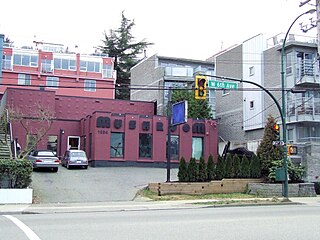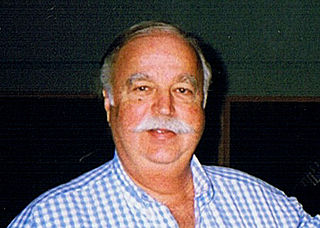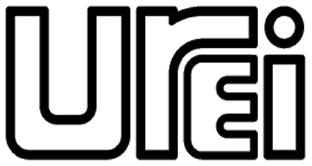See also
- Universal Recording Corporation, former recording studio in Chicago founded by Bill Putnam, Sr.
- United Western Recorders, Hollywood independent recording studios in the 1960s
Universal Audio may refer to:

Capitol Records, LLC is an American record label owned by Universal Music Group through its Capitol Music Group imprint. It was founded as the first West Coast-based record label of note in the United States in 1942 by Johnny Mercer, Buddy DeSylva, and Glenn E. Wallichs. Capitol was acquired by British music conglomerate EMI as its North American subsidiary in 1955. EMI was acquired by Universal Music Group in 2012, and was merged with the company a year later, making Capitol and the Capitol Music Group both distributed by UMG. The label's circular headquarters building is a recognized landmark of Hollywood, California.

Vee-Jay Records is an American record label founded in the 1950s, located in Chicago and specializing in blues, jazz, rhythm and blues and rock and roll.

Wally Heider Studios was a recording studio founded in San Francisco in 1969 by recording engineer and studio owner Wally Heider. Between 1969 and 1980, numerous notable artists recorded at the studios, including Creedence Clearwater Revival, Jefferson Airplane, Crosby, Stills, Nash & Young, and The Grateful Dead. The studio changed ownership in 1980 and was renamed Hyde Street Studios, which is still in operation today.

United Western Recorders was a two-building recording studio complex in Hollywood that was one of the most successful independent recording studios of the 1960s. The complex merged neighboring studios United Recording Corp. on 6050 Sunset Boulevard and Western Studio on 6000 Sunset Boulevard.
Milton Tasker "Bill" Putnam was an American audio engineer, songwriter, producer, studio designer and businessman, who has been described as "the father of modern recording". He was the inventor of the modern recording console and is recognised as a key figure in the development of the postwar commercial recording industry.
Ocean Way Recording was a series of recording studios established by recording engineer and producer Allen Sides with locations in Los Angeles, California, Nashville, Tennessee, and Saint Barthélemy. Ocean Way Recording no longer operates recording facilities, but Ocean Way Nashville continues to operate under the ownership of Belmont University.

Mushroom Studios was a music recording facility located in Vancouver, British Columbia, Canada with a long history in Canadian music. It has now been relocated to Toronto, Ontario, Canada.

Bill Porter was an American audio engineer who helped shape the Nashville sound and recorded stars such as Chet Atkins, Louis Armstrong, the Everly Brothers, Elvis Presley, Gladys Knight, Barbra Streisand, Diana Ross, Skeeter Davis, Ike & Tina Turner, Sammy Davis Jr., and Roy Orbison from the late 1950s through the 1980s. In one week of 1960, his recordings accounted for 15 of Billboard magazine's Top 100, a feat none has matched. Porter's engineering career included over 7,000 recording sessions, 300 chart records, 49 Top 10, 11 Number Ones, and 37 gold records.

Bruce Swedien ; April 19, 1934 – November 16, 2020) was an American recording engineer, mixing engineer and record producer. He was widely known for his work with Michael Jackson, Quincy Jones, Paul McCartney and Barbra Streisand.
Universal is the adjective for universe.
Wally Heider was an American recording engineer and recording studio owner who refined and advanced the art of studio and remote recording and was instrumental in recording the San Francisco Sound in the late 1960s and early 1970s, recording notable acts including Jefferson Airplane, Crosby, Stills, Nash & Young, Van Morrison, the Grateful Dead, Creedence Clearwater Revival, and Santana.

United Recording Electronics Industries (UREI) was a manufacturer of recording, mixing and audio signal processing hardware for the professional recording studio, live sound and broadcasting fields.
Universal Recording Corporation was a recording studio in Chicago founded by Bill Putnam, Sr. for the purpose of investigating new recording techniques and the development of specialized recording equipment.

Universal Audio is an American company that designs, imports, and markets audio signal processing hardware and effect pedals, audio interfaces, digital signal processing, virtual instrument, and digital audio workstation software and plug-ins.
Dayton Burr "Bones" Howe is an American record producer and recording engineer who scored a string of hits in the 1960s and 1970s, often of the sunshine pop genre, starting in 1965 with The Turtles cover of Bob Dylan's "It Ain't Me Babe," and continuing with most of the hits of the 5th Dimension and the Association. With the exception of Closing Time, he produced and engineered all of Tom Waits' releases with Asylum Records, some of which are considered among the artist's best recordings. Their almost decade-long collaboration has been described as "one of the great artist-producer partnerships". Howe performed music supervision on several feature films, and was one of the first industry members to serve as both producer and engineer of the hit records on which he worked. In addition, he was occasionally credited as a musician on recordings as "Dayton Howe".

The LA-2A Leveling Amplifier is an audio compressor produced by Teletronix Engineering Company from 1965 until 1969, and reissued in 2000 by Universal Audio.

The 1176 Peak Limiter is a dynamic range compressor designed by the American engineer Bill Putnam and introduced by UREI in 1967. Derived from the 175 and 176 tube compressors, it marked the transition from vacuum tubes to solid-state technology.
Universal Music Group is the largest music corporation in the world.
Peter Doell is an American recording and mastering engineer known for his work with Miles Davis, Toto, Céline Dion and The Beach Boys. Doell has been a staff engineer at Capitol Studios, Sunset Sound Recorders and Universal Mastering Studios West. His film and TV work includes Road To Perdition, Black Hawk Down and Monsters, Inc., American Idol, The Voice and Empire.
A reverb effect, or reverb, is an audio effect applied to a sound signal to simulate reverberation. It may be created through physical means, such as echo chambers, or electronically through audio signal processing. The American producer Bill Putnam is credited for the first artistic use of artificial reverb in music, on the 1947 song "Peg o' My Heart" by the Harmonicats.